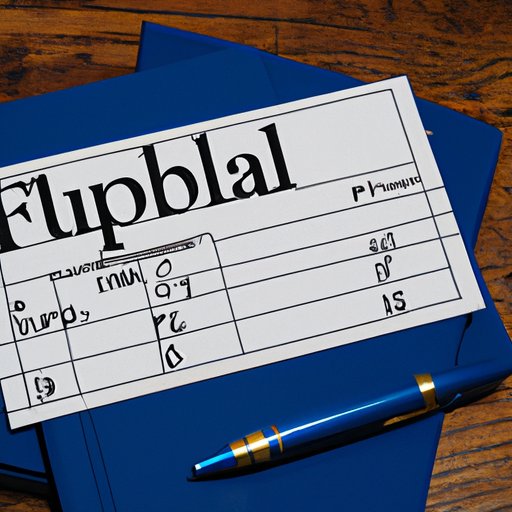Introduction
Chapter 7 bankruptcy is a type of debt relief that allows individuals to have their eligible debts discharged. It is often seen as a last resort for those who are facing overwhelming financial hardship. While filing for Chapter 7 bankruptcy may give you some much-needed relief from your debt, it is important to understand the costs associated with filing in order to make an informed decision.
Exploring the Cost of Filing Chapter 7 Bankruptcy
When considering filing for Chapter 7 bankruptcy, there are several fees that must be taken into account. These fees include court filing fees, attorney fees, credit counseling courses, and other costs. In order to get a better understanding of the cost of filing for Chapter 7 bankruptcy, let’s take a closer look at each of these fees.
Court Filing Fees
The first fee associated with filing for Chapter 7 bankruptcy is the court filing fee. This fee varies depending on the state where you are filing, but typically ranges between $335 and $500. In some cases, the court may waive this fee if you are unable to pay it. Additionally, the court may allow you to pay the fee in installments.
Attorney Fees
Another cost associated with filing for Chapter 7 bankruptcy is attorney fees. Attorney fees vary depending on the complexity of your case, but typically range between $1,000 and $2,500. It is important to note that attorney fees are not required, however, many people choose to hire an attorney to help them navigate the complex legal system associated with filing for bankruptcy.
Credit Counseling Courses
In addition to court filing fees and attorney fees, you will also need to take a pre-filing credit counseling course. This course typically costs between $25 and $50, and must be completed before you can file for Chapter 7 bankruptcy. The purpose of this course is to educate you about the bankruptcy process and provide you with resources to help manage your finances after filing.
Other Costs
Finally, there are other miscellaneous costs associated with filing for Chapter 7 bankruptcy. For instance, you may need to pay for copies of financial documents or for postage when sending documents to the court. You may also need to pay for transportation to and from court hearings or meetings with creditors. These costs are typically minimal, however, it is important to factor them into your overall budget.

The Financial Impact of Filing for Chapter 7 Bankruptcy
In addition to the costs associated with filing for Chapter 7 bankruptcy, it is important to consider the potential financial impact. On the one hand, filing for bankruptcy can provide you with immediate relief from your debt. On the other hand, it can have a negative impact on your credit score and make it more difficult to obtain financing in the future.
What to Expect When Filing Chapter 7 Bankruptcy
Before you can file for Chapter 7 bankruptcy, there are certain steps that must be taken. First, you must complete a credit counseling course. This course typically takes two to three hours and must be completed within 180 days of filing. Additionally, you must provide proof of income and copies of your most recent tax returns.
Once you have completed the pre-filing requirements, you will need to begin the filing process. This process involves completing the petition, which is a document that outlines all of your assets, liabilities, and income. Once the petition has been completed, you will need to attend the meeting of creditors, which is a hearing where creditors can ask questions about your financial situation.

Breaking Down the Cost of a Chapter 7 Bankruptcy
As we’ve discussed, there are several costs associated with filing for Chapter 7 bankruptcy. Let’s take a closer look at each of these costs to get a better understanding of what you can expect when filing for Chapter 7 bankruptcy.
Court Filing Fees
The court filing fee for Chapter 7 bankruptcy is typically between $335 and $500, depending on the state where you are filing. In some cases, the court may waive this fee if you are unable to pay it. Additionally, the court may allow you to pay the fee in installments.
Attorney Fees
Attorney fees for filing for Chapter 7 bankruptcy typically range between $1,000 and $2,500, depending on the complexity of your case. While attorney fees are not required, they can be helpful in navigating the complex legal system associated with filing for bankruptcy.
Credit Counseling Courses
In order to be eligible to file for Chapter 7 bankruptcy, you must take a pre-filing credit counseling course. This course typically costs between $25 and $50, and must be completed before you can file for bankruptcy.
Other Costs
In addition to the court filing fee, attorney fees, and credit counseling course, there are other costs associated with filing for Chapter 7 bankruptcy. These costs include copies of financial documents, postage fees, and transportation fees. These costs are typically minimal, however, it is important to factor them into your overall budget.

A Comprehensive Guide to the Cost of Filing Chapter 7 Bankruptcy
Filing for Chapter 7 bankruptcy can be a complicated and costly process. Understanding the costs associated with filing is essential to making an informed decision. Here is a comprehensive guide to the cost of filing Chapter 7 bankruptcy:
Understanding the Cost of Chapter 7 Bankruptcy
The cost of filing for Chapter 7 bankruptcy includes court filing fees, attorney fees, and credit counseling courses. The court filing fee is typically between $335 and $500, depending on the state where you are filing. Attorney fees typically range between $1,000 and $2,500, depending on the complexity of your case. Finally, the pre-filing credit counseling course typically costs between $25 and $50.
Steps to Take Before Filing Bankruptcy
Before filing for Chapter 7 bankruptcy, you must complete a pre-filing credit counseling course. This course typically takes two to three hours and must be completed within 180 days of filing. Additionally, you must provide proof of income and copies of your most recent tax returns.
Managing Your Finances After Bankruptcy
Filing for Chapter 7 bankruptcy can have a negative impact on your credit score, making it more difficult to obtain financing in the future. Therefore, it is important to develop a plan to manage your finances after filing. This plan should include creating a budget, paying bills on time, and avoiding unnecessary debt.
Conclusion
Filing for Chapter 7 bankruptcy can be a complicated and costly process. Between court filing fees, attorney fees, and credit counseling courses, the cost of filing for Chapter 7 bankruptcy can add up quickly. It is important to understand the costs associated with filing in order to make an informed decision. Additionally, it is important to develop a plan to manage your finances after filing to ensure a successful financial future.
(Note: Is this article not meeting your expectations? Do you have knowledge or insights to share? Unlock new opportunities and expand your reach by joining our authors team. Click Registration to join us and share your expertise with our readers.)
